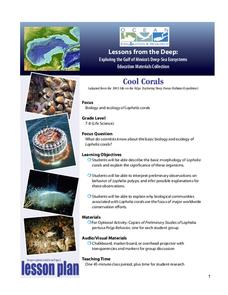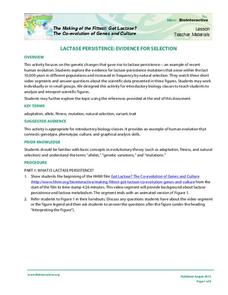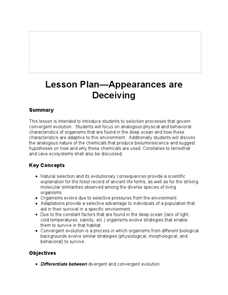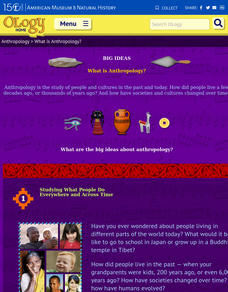Gallantsbiocorner.com
Cell Membrane & Transport
Young scientists demonstrate their understanding of cell transport on this comprehensive worksheet. Focusing on cellular structure and the different processes that allow materials to move into, out of, and throughout animal...
NOAA
Deep-Sea Ecosystems – Cool Corals
Young oceanographers research deep sea corals that thrive on chemosynthesis. The lesson focuses on the biology of the animal, preferred habitat, associations, and interactions.
NOAA
Community Ecology and Sampling
Seamounts in the Coral and Tasman Seas are home to more than 850 different species. Groups explore hydrothermal vents, researching the organisms found there and their energy source. They also learn about seamounts, exploring their unique...
Howard Hughes Medical Institute
Lactase Persistence: Evidence for Selection
What's the link between lactase persistence and dairy farming? Biology scholars analyze data to find evidence of the connection, then relate this to human adaptation. Working individually and in small groups, learners view short video...
Curated OER
Respiratory, Circulatory, and Urogenital Systems in the Rat
Here is a lesson which describes a lab activity in which a rat is dissected, and its heart is studied. The lesson has ample background information about three of the rats internal systems, and excellent lab sheets that support the...
Colombia University NSEC
Lesson #3 ~ Nanoscience and Nanotechnology
Here is a six-page script for your biology, chemistry, or physics class to read out loud as a way of investigating nanoscience. This particular lesson is actually a continuation of "Lesson #2 - Nanoscience and Nanotechnology," written in...
Curated OER
Student Reading - The Unique Properties of Water
Without water there would be no life on this planet. Biology learners find out why by reading this handout. Create a worksheet of questions to answer after the reading. Follow it up with quick demonstrations or laboratory activities that...
Curated OER
Lesson Plan - Appearances are Deceiving
Herre is a activity on divergent and convergent evolution. It has links to terrific video clips, an associate worksheet, and more. The analysis questions have been reviewed separately on Lesson Planet if you would like more information....
Curated OER
How do Hypotonic, Hypertonic, and Isotonic Solutions Affect the Water Movement of a Cell?
After removing the shell from a raw egg, cell biologists soak the egg in either a hypotonic, hypertonic, or isotonic corn syrup solution. They calculate the percent change in mass and compare it to the strength of the solution in a...
Curated OER
Pea Plant Punnett Square Worksheet
How often do you find a science worksheet that comes with separate teacher's instructions? Here is one of those rare instances. Goals and objectives, materials, and evaluation guidelines precede the actual assignment. Biology leaners...
Curated OER
Speciation and Genetic Drift Worksheet
Fifteen terms pertaining to speciation, extinction, and gene flow are to be matched to their definitions. This simple, easy-to-read worksheet can be used as a pop quiz for your biology learners when studying natural selection principles...
Curated OER
Evolution Study Guide
Thirty short-answer questions comprise this detailed review of evolution theory. Many of the questions ask scholars to define vocabulary. Because short answers are required, this worksheet will take some time to complete. You could give...
Curated OER
Fueling Body Activities - Digestion
Not only is the human digestive system covered in this biology worksheet, learners will also explore the digestive process of other animals. The 30 short-answer questions address modes of heterotrophic nutrition, the function of each...
Curated OER
Cell Structure
Your accelerated biology learners will add to their understanding of cell structure with this resource. Taking them beyond the basics of mitochondria and chromatin, it also queries them about actin microfilaments and the extracellular...
Curated OER
Genetics Practice 3: Probability Practice
Practice calculating genetic probability, listing gametes, and identifying genotypes. The instructional activity combines short answer questions with practice problems to solve. It would make a revealing review assignment or even a...
Curated OER
Generating Hypotheses & Experimental Design 2
An outline walks your scientists through the steps of the scientific process. It begins by taking a general idea and developing a hypothesis based on related factors. Each investigator then plans a method for testing the hypothesis,...
Curated OER
Cellular Respiration: Other Metabolites and Control of Respiration
The feedback mechanisms of metabolism of a variety of substances in the human body. Carbohydrates, lipids, amino acids, and their derivatives are explained. The biochemistry required to explain the metabolic balance and feedback controls...
Curated OER
Photosynthesis: Life from Light and Air
All aspects of the photosynthesis process, and the way that plants have adapted with specializations are detailed here. The diagrams and info-graphics will be useful to your AP biology class. It could also be used as a review...
Curated OER
Blood
Although there are vocabulary terms in this PowerPoint that use British spelling, the presentation is attractive and educational. The content flows from the general composition of blood, into the different types of blood cells and their...
Concord Consortium
Polymers and Monomers
You don't want to break these chains! Show young chemists and biologists the basics of polymerization with a simple interactive. The resource gives learners three types of polymers to experiment with, as well as a brief tutorial about...
American Museum of Natural History
What is Anthropology
A colorful resource introduces learners to the four major fields of anthropology: cultural anthropology, linguistic anthropology, biological anthropology, and archaeology. Explanations are provided for what each field studies, the kinds...
Curated OER
Big Fleas Have Little Fleas
A benthic habitat hosts a vast collection of organisms and its structure influences the biodiversity. Middle-school marine biology explorers will discuss how corals impact structure, and therefore diversity, on the ocean floor. They draw...
Curated OER
How Diverse is That?
Compare various types of biological diversity in a coral reef and calculate a numeric indicator that describes the diversity found in coral communities. Your class can work in groups to look at the abundance and distribution data of...
Curated OER
Save a Reef!
Design a public information campaign to improve understanding of the coral reef crisis. Read about and discuss the biology and threats to the coral reef. The class creates a public information program about the problems facing the coral...























